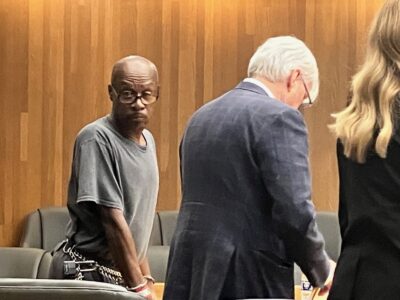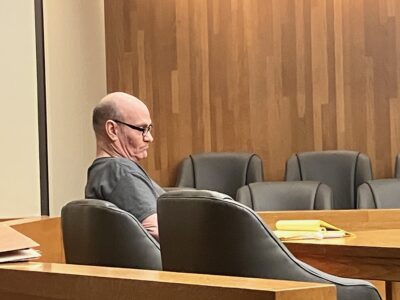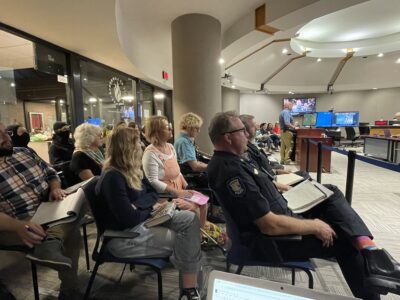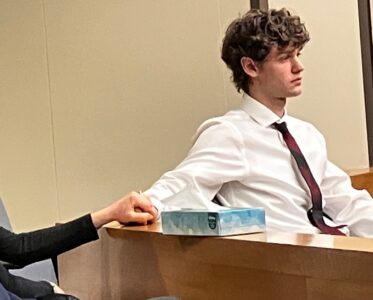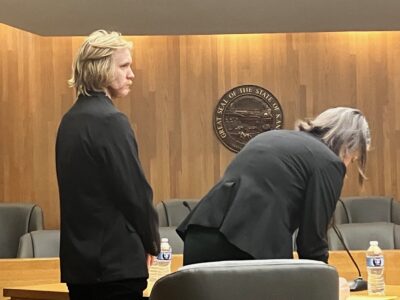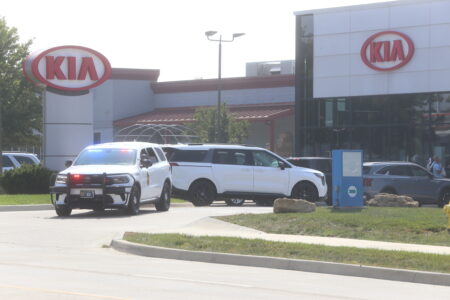Double murder trial delayed; defendant sought to have attorney removed, but judge allows more time to review evidence

photo by: Kim Callahan/Journal-World
Defendant Rodney Marshall, left, appears Thursday, Jan. 2, 2025, in Douglas County District Court.
A double murder case took a surprising turn Thursday when a Douglas County judge, with evident dismay, granted a continuance just a few days before the trial was set to begin and after more than 100 potential jurors had been summoned.
“I’m frustrated,” Judge Amy Hanley said at a hearing for the defendant, Rodney Marshall, whose trial will now be next spring instead of next Monday. “I don’t want to continue this trial, but I have to under the law.”
Hanley said a delay was required to give defense attorneys more time to review evidence so that they could provide effective assistance of counsel.
But before she granted that continuance, Hanley put the hearing on hold for over an hour so that relatives of the homicide victims, who hadn’t been notified of Thursday’s hearing, could be present to hear why the trial was potentially going to be delayed.
Marshall is accused of first-degree murder in the deaths of Lawrence residents Shelby McCoy, 52, and William D. O’Brien, 43, on July 31, 2022.
The 11th-hour delay came on the heels of Marshall filing a handwritten motion on Monday asking Hanley to remove his defense counsel. Marshall wrote that attorney Cline Boone, who is representing him along with attorney Matthew Cohen, had been negligent in not earlier becoming aware of a discrepancy between medical reports regarding whether McCoy had been shot in the front or the back of his head — a determination that would have bearing on an argument of self-defense.

photo by: Kim Callahan/Journal-World
Defendant Rodney Marshall, left, appears Thursday, Jan. 2, 2025, in Douglas County District Court with his attorneys, Matthew Cohen, standing, and Cline Boone.
Boone, who the next day — Tuesday — filed a motion for continuance, told the court Thursday that he and Marshall were able to “work through” the differences that had led to Marshall’s motion to dismiss him.
Boone said his request for a continuance was based on three factors: having only recently been able to access footage from three of Marshall’s home security cameras; the need for a toxicology expert to analyze blood screens showing substances in Marshall’s blood two days after the deaths — a factor that would go to voluntary intoxication, and hence whether premeditation existed; and the discrepancy between autopsy and hospital reports about whether a bullet had struck McCoy in the front or the back of his head.
Hanley said that the most significant reason to grant a continuance was the bullet discrepancy that was only recently noticed by Marshall’s attorneys, which Boone attributed to the challenge of sorting through thousands of pages of discovery. The information pertaining to the discrepancy was on a single page, he said, out of 26,000.
“Where someone was shot would make a difference,” Hanley agreed, noting that the hospital reports that would shed light on the issue must be obtained and reviewed by the defense before trial.
Hanley pointed out that the missing reports did not constitute a discovery violation by prosecutors, who said they did not plan to use the specific hospital reports given that McCoy had been shot multiple times elsewhere on his body.
Deputy District Attorney David Greenwald said that the state was prepared to go to trial on Monday, but that it “stood silent” with respect to the defense request for a continuance — meaning it did not object to it or agree to it, but left it to the court’s discretion.
Hanley also found the need for a toxicology expert compelling, noting that an expert engaged by the defense had not been available recently and that expert input on how to interpret the blood screen was important for Marshall’s defense.
The camera evidence, which would show who was in Marshall’s house in the days leading up to the killings, was the least compelling to Hanley as a reason for delay and would not in itself be a reason to continue the trial, she said. Hanley noted that the defense had the footage from Marshall’s Wyze cameras in a timely way. She further noted that the video footage was owned and recorded by Marshall and that he was in the best position to know what it contained.
After Hanley granted the trial continuance — until March 31 — she asked Marshall if he still wanted to pursue his motion to drop his legal counsel. He said he did not, to which Hanley replied, “That is very wise.”
To the relatives of the slain men, Hanley said she understood their frustration with the long and complex legal process.
“It’s not a sprint,” she said. “It’s a marathon.”


